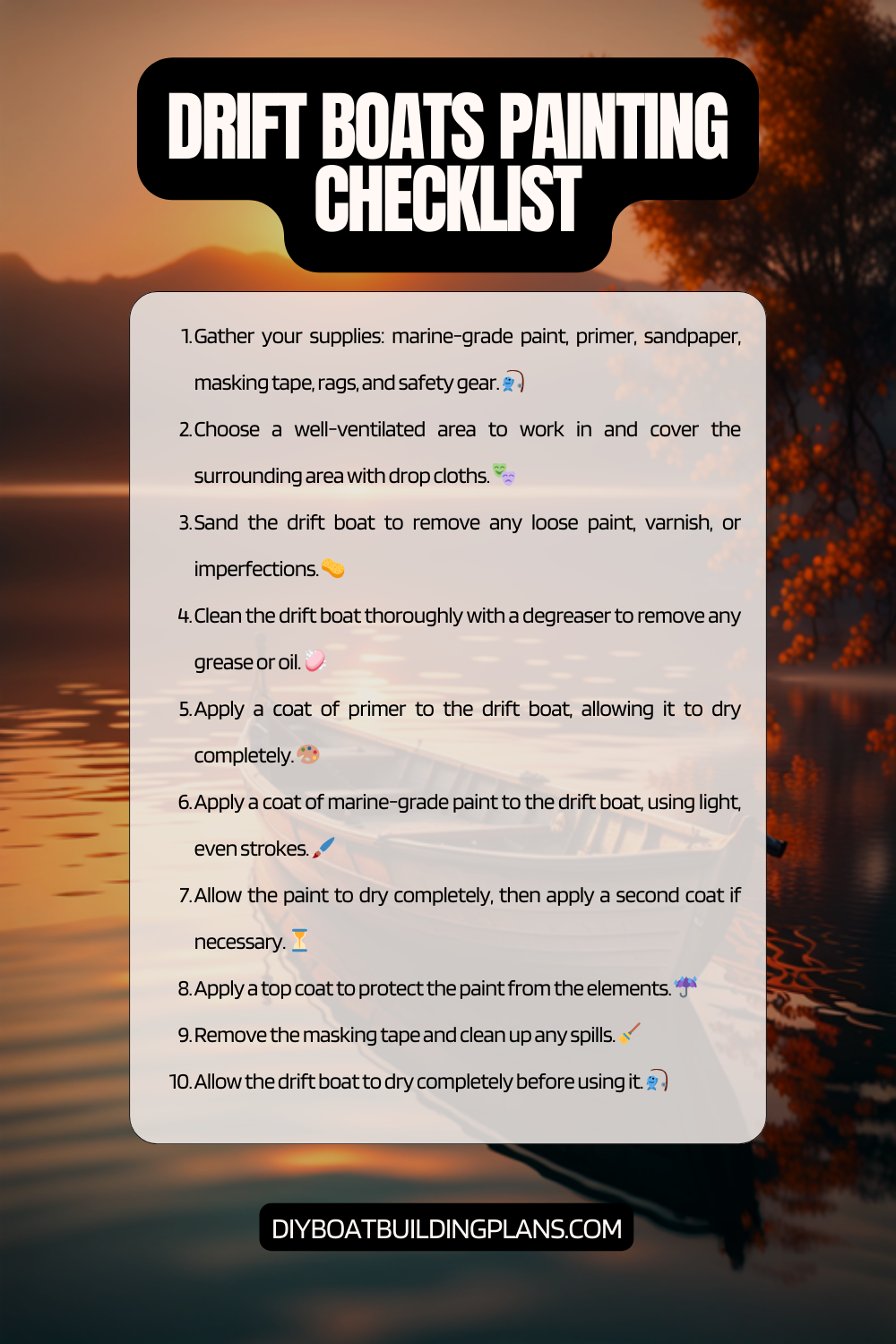Overview of Drift Boat Painting Tips
Drift boats are an essential tool for anglers who enjoy fishing in rivers and streams. These boats are designed to navigate shallow waters and provide a stable platform for casting and reeling in fish. While functionality is crucial, the appearance of a drift boat should not be overlooked. Painting a drift boat not only enhances its aesthetic appeal but also provides protection against the elements. In this article, we will explore the importance of painting a drift boat and the benefits it brings.
Painting a drift boat offers several advantages. Firstly, it serves as a protective layer against water, UV rays, and other environmental factors that can damage the boat’s surface over time. A well-painted boat is less prone to rotting, warping, or fading, ensuring its longevity and durability. Secondly, a freshly painted drift boat can significantly increase its resale value. A well-maintained and visually appealing boat is more likely to attract potential buyers and fetch a higher price. Lastly, painting your drift boat allows you to personalize it according to your preferences. You can choose colors that reflect your personality or add graphics and designs that make your boat stand out on the water.
Key Takeaways
- Choose the right paint for your drift boat based on its material and intended use.
- Properly prepare your drift boat for painting by cleaning, sanding, and priming.
- Use sanding techniques to achieve a smooth finish before painting.
- Apply paint using professional techniques for a polished look.
- Protect your newly painted drift boat with a clear coat and maintain it regularly.

Choosing the Right Paint for Your Drift Boat
When it comes to choosing the right paint for your drift boat, there are several options available in the market. The most common types of paint used for drift boats are marine-grade paints, such as epoxy-based paints or polyurethane paints. These paints are specifically formulated to withstand the harsh conditions of water exposure and provide excellent adhesion to various surfaces.
When selecting paint for your drift boat, consider factors such as durability, ease of application, and resistance to fading. Marine-grade paints are known for their durability and ability to withstand constant exposure to water, sunlight, and other elements. Additionally, opt for paints that are easy to apply and provide good coverage with minimal effort. Lastly, choose paints that are resistant to fading, as prolonged exposure to sunlight can cause colors to dull over time.
Preparing Your Drift Boat for Painting
Before diving into the painting process, it is crucial to prepare your drift boat properly. Proper preparation ensures that the paint adheres well to the surface and results in a smooth and professional-looking finish. The first step is to clean the boat thoroughly, removing any dirt, grime, or old paint. Use a mild detergent and water solution to scrub the boat’s surface, paying extra attention to areas with stubborn stains or residue.
After cleaning, inspect the boat for any damages or imperfections that need to be addressed before painting. Repair any cracks, dents, or scratches using appropriate fillers or sealants. Once the repairs are complete, sand the entire surface of the boat using sandpaper or a sanding machine. This step helps create a smooth and even surface for the paint to adhere to.
Sanding Techniques for a Smooth Finish
| Technique | Description | Advantages | Disadvantages |
| Hand Sanding | Sanding by hand using sandpaper or sanding blocks. | Controlled sanding, good for small areas, inexpensive. | Time-consuming, inconsistent results, can cause fatigue. |
| Power Sanding | Sanding using power tools such as orbital sanders or belt sanders. | Efficient, consistent results, good for large areas. | Expensive, can cause damage if not used properly, noisy. |
| Wet Sanding | Sanding using water and sandpaper to create a smooth finish. | Reduces dust, creates a smoother finish, good for automotive finishes. | Messy, requires more time and effort, can cause rust if not done properly. |
| Buffing | Using a buffing wheel and compound to create a high-gloss finish. | Creates a mirror-like finish, good for automotive finishes, efficient. | Requires specialized equipment, can cause damage if not done properly, messy. |
Sanding is a crucial step in achieving a professional-looking paint job on your drift boat. It helps remove any roughness or imperfections on the surface and ensures that the paint adheres properly. There are different sanding techniques you can employ depending on the condition of your boat’s surface.
For rough surfaces or areas with old paint, start with coarse-grit sandpaper and gradually move to finer-grit sandpaper. This process helps remove any loose paint or roughness and creates a smooth base for the new paint. Sand in a circular motion, applying even pressure throughout.
For areas that require more precision, such as corners or edges, use sanding blocks or small pieces of sandpaper wrapped around your fingers. This allows you to reach tight spaces and achieve an even finish.
Remember to clean the boat thoroughly after sanding to remove any dust or debris before moving on to the next step.
Applying Primer to Your Drift Boat
Primer is an essential component of the painting process as it helps the paint adhere better to the surface and provides an additional layer of protection. Before applying primer, ensure that the boat’s surface is clean and dry.
Start by applying a thin coat of primer using a brush or roller. Work in small sections, ensuring even coverage. Allow the primer to dry completely before applying additional coats. Depending on the type of primer used, multiple coats may be necessary to achieve the desired level of coverage and protection.
Primer also helps identify any remaining imperfections on the boat’s surface. After each coat of primer has dried, inspect the boat for any areas that require further sanding or repairs. Address these issues before moving on to the next step.
Tips for Painting Your Drift Boat
When it comes to painting your drift boat, there are several techniques and tips to consider for a professional-looking finish. Firstly, choose the right tools for the job. Brushes and rollers are commonly used for painting boats, but consider using a sprayer for a more even and efficient application.
Before painting, ensure that you have adequate ventilation in your workspace to prevent fumes from accumulating. Additionally, work in a well-lit area to ensure that you can see any imperfections or missed spots.
When applying paint, start with thin coats and gradually build up the layers. This helps prevent drips or runs and allows for better control over the final result. Work in small sections, ensuring even coverage and blending between each section.
Lastly, be patient and allow each coat of paint to dry completely before applying additional coats or moving on to the next step. Rushing the process can lead to uneven drying and compromise the overall finish.
Painting Techniques for a Professional Look
For those looking to take their drift boat painting skills to the next level, there are advanced techniques that can be employed to achieve a professional look. One such technique is called “tipping off.” After applying a coat of paint, lightly run a dry brush or roller over the wet paint to smooth out any brush or roller marks. This technique helps create a smooth and even finish.
Another technique to consider is “feathering.” Feathering involves blending the edges of each painted section to create a seamless transition between colors or sections. This technique requires a steady hand and practice but can result in a more professional-looking paint job.
Additionally, consider using stencils or masking tape to create intricate designs or patterns on your drift boat. This allows for personalization and adds a unique touch to your boat’s appearance.
Adding Graphics and Designs to Your Drift Boat
Adding graphics and designs to your drift boat is an excellent way to personalize it and make it stand out on the water. There are various ways to achieve this, depending on your preferences and skill level.
One option is to use vinyl decals or stickers. These can be easily applied to the boat’s surface and come in a wide range of designs and colors. Vinyl decals are durable and can withstand exposure to water and sunlight.
For those with artistic skills, consider hand-painting designs directly onto the boat’s surface. This allows for complete customization and creates a truly unique look. Use high-quality marine-grade paints and brushes suitable for the task.
Another option is to hire a professional painter or graphic designer to create custom graphics for your drift boat. This ensures a high-quality finish and allows for more intricate designs that may be beyond your own capabilities.
Protecting Your Drift Boat with a Clear Coat
After completing the painting process, it is essential to protect your drift boat’s new finish with a clear coat. A clear coat provides an additional layer of protection against UV rays, water, and other environmental factors that can damage the paint over time.
Before applying the clear coat, ensure that the painted surface is clean and free from any dust or debris. Apply the clear coat in thin, even layers, allowing each coat to dry completely before applying the next. Multiple coats may be necessary to achieve the desired level of protection.
Download over 500 Boat Plans. Click on the link below.
-->Click Here<--
Maintenance Tips for Your Newly Painted Drift Boat
To ensure the longevity and durability of your newly painted drift boat, proper maintenance is crucial. Here are some tips to help you maintain the paint job:
1. Regularly wash your boat with mild detergent and water to remove dirt, salt, or other contaminants that can damage the paint.
2. Avoid using abrasive cleaners or brushes that can scratch or dull the paint.
3. Apply a wax or polish specifically designed for boats to protect the paint and enhance its shine.
4. Inspect your boat regularly for any signs of damage or wear and address them promptly to prevent further deterioration.
5. Store your boat in a covered area or use a boat cover when not in use to protect it from prolonged exposure to sunlight and other elements.
By following these maintenance tips, you can ensure that your drift boat’s paint job remains vibrant and intact for years to come.
Drift Boat Painting Checklist

Conclusion – Drift Boat Painting Tips
In conclusion, painting a drift boat is not only about enhancing its appearance but also about protecting it from the harsh conditions it faces on the water. Choosing the right paint, properly preparing the surface, and employing proper painting techniques are essential for achieving a professional-looking finish.
By taking the time to sand, apply primer, and use advanced painting techniques, you can elevate your drift boat’s appearance and make it truly unique. Adding graphics and designs further personalizes your boat and sets it apart from others on the water.
Remember to protect your newly painted drift boat with a clear coat and maintain it regularly to ensure its longevity. With proper care and attention, your drift boat’s paint job will continue to impress and protect for many fishing adventures to come.
FAQs – Drift Boat Painting Tips
What is a drift boat?
A drift boat is a type of fishing boat that is designed to navigate shallow and fast-moving waters. It is typically made of wood or fiberglass and has a flat bottom and a pointed bow and stern.
Why should I paint my drift boat?
Painting your drift boat can help protect it from the elements and extend its lifespan. It can also improve its appearance and make it easier to spot on the water.
What type of paint should I use?
The type of paint you should use depends on the material your drift boat is made of. For wooden boats, marine-grade paint is recommended. For fiberglass boats, gelcoat or marine-grade paint can be used.
How do I prepare my drift boat for painting?
Before painting your drift boat, you should clean it thoroughly and sand any rough or uneven areas. You should also remove any old paint or varnish and fill any cracks or holes with epoxy or wood filler.
What tools do I need to paint my drift boat?
You will need a variety of tools to paint your drift boat, including brushes, rollers, sandpaper, masking tape, and a paint sprayer (optional). You may also need a respirator and protective clothing to avoid inhaling paint fumes.
How many coats of paint should I apply?
The number of coats of paint you should apply depends on the type of paint you are using and the condition of your drift boat. Generally, two to three coats of paint are recommended for optimal coverage and protection.
How long does it take for the paint to dry?
The drying time for paint varies depending on the type of paint and the weather conditions. Generally, it takes 24 to 48 hours for paint to dry completely. It is important to avoid exposing your drift boat to water or other elements until the paint is fully dry.



